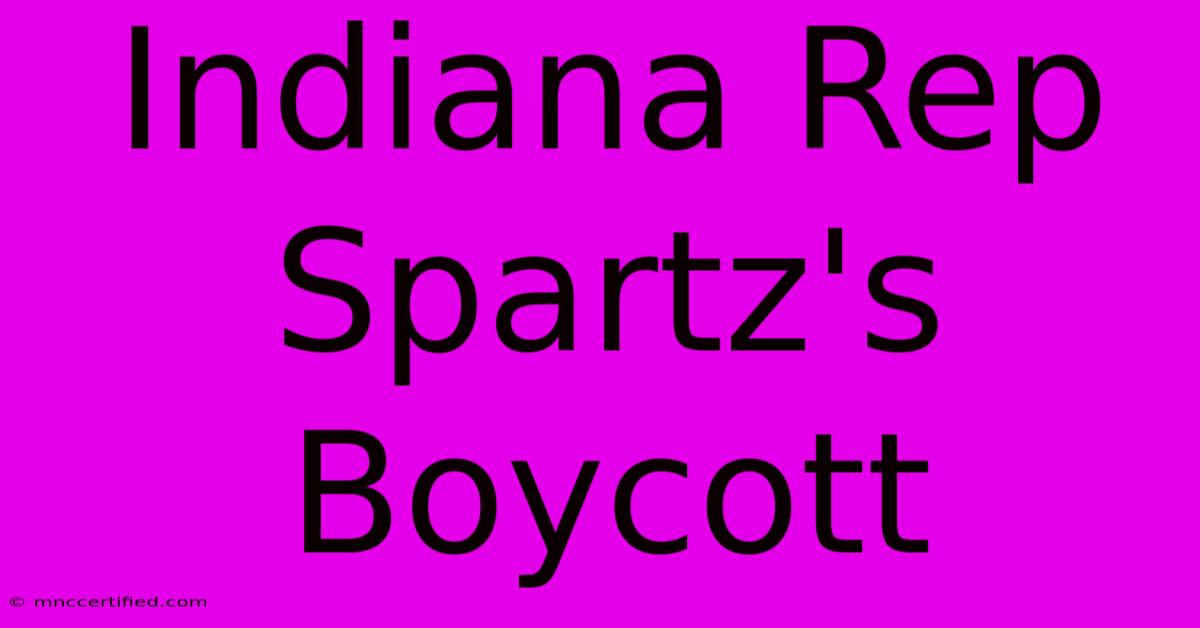Indiana Rep Spartz's Boycott

Table of Contents
Indiana Rep. Victoria Spartz's Boycott: A Deep Dive into the Controversy
Indiana Representative Victoria Spartz's recent boycott of certain House Republican votes has ignited a firestorm of debate and speculation. This article will delve into the details surrounding her actions, exploring the reasons behind her boycott, its implications for the Republican party, and the broader political context.
Understanding the Boycott: What Happened?
Rep. Spartz, a Republican representing Indiana's 5th congressional district, announced a boycott of certain House Republican votes, specifically those related to leadership positions and internal party matters. This wasn't a blanket refusal to participate in all votes, but rather a targeted abstention from specific proceedings. While the exact reasons remain somewhat opaque, her actions have been interpreted as a protest against the current leadership structure and internal dynamics within the House Republican caucus.
Key Aspects of the Boycott:
- Targeted Nature: The boycott wasn't a complete withdrawal from legislative duties, but a selective abstention. This suggests a specific grievance rather than a broad dissatisfaction with the Republican Party.
- Lack of Transparency: Rep. Spartz hasn't explicitly laid out all her reasons, leading to much speculation and varying interpretations of her motivations. This lack of transparency fuels ongoing discussions and analysis.
- Political Implications: The boycott's impact reaches beyond Indiana's 5th district, affecting the delicate balance of power within the House of Representatives and raising questions about party unity.
Potential Reasons Behind Rep. Spartz's Actions:
Several theories attempt to explain Rep. Spartz's boycott, ranging from internal party conflicts to broader policy disagreements. These include:
- Internal Power Struggles: Potential disagreements with House leadership or factions within the Republican party could be a driving force. Competition for influence and resources within the party are common, and Rep. Spartz's actions could be a manifestation of such tensions.
- Policy Disagreements: While not explicitly stated, differing opinions on key policy issues could contribute to her boycott. A feeling of being marginalized or unheard within the party on important legislative matters might have prompted her actions.
- Strategic Maneuvering: Some suggest the boycott is a calculated political move aimed at gaining leverage or attracting attention to her concerns. This strategy, while risky, could be intended to force a reconsideration of certain policies or leadership decisions.
- Ukraine Concerns: Given Rep. Spartz's Ukrainian heritage and vocal advocacy for Ukraine, some speculate her actions might be indirectly related to perceived shortcomings in the US response to the ongoing conflict. This remains a largely speculative connection, however.
The Broader Political Context:
Rep. Spartz's actions occur against a backdrop of increasing polarization and internal divisions within the Republican party. Her boycott highlights the challenges faced by the party in maintaining unity and navigating internal disagreements. The impact of this event could ripple through future elections and legislative processes.
Impact and Analysis:
- Party Unity: The boycott undeniably undermines party unity, potentially weakening the Republican's ability to effectively advance their legislative agenda.
- Public Perception: How the public perceives Rep. Spartz's actions will shape her political future and the perception of the Republican party itself. Public opinion will likely be divided, with some applauding her stance and others criticizing her actions.
- Future Implications: The long-term effects remain to be seen. Will other Republicans follow suit? Will the party address the underlying issues that led to the boycott? These questions remain open for discussion.
Conclusion: Unpacking the Mystery
Rep. Victoria Spartz's boycott is more than just a single event; it's a symptom of deeper underlying tensions within the Republican party. While the full motivations remain unclear, the event raises critical questions about party unity, internal dynamics, and the broader political landscape. Further developments and Rep. Spartz's future actions will undoubtedly provide more clarity on this ongoing situation. The coming weeks and months will offer crucial insights into the ramifications of this significant political event.
Keywords: Victoria Spartz, Indiana, Republican Party, House of Representatives, boycott, political controversy, internal conflict, party unity, policy disagreements, Ukraine, leadership, congressional votes.

Thank you for visiting our website wich cover about Indiana Rep Spartz's Boycott. We hope the information provided has been useful to you. Feel free to contact us if you have any questions or need further assistance. See you next time and dont miss to bookmark.
Featured Posts
-
Bellinger To Yankees Latest Rumors
Dec 18, 2024
-
Ev Competition Spurs Honda Nissan Talks
Dec 18, 2024
-
Matilda Djerf Addresses Workplace Claims
Dec 18, 2024
-
Gale Warning West Coast Yellow Alert
Dec 18, 2024
-
Keely Hodgkinson Bbc Spoty Winner
Dec 18, 2024